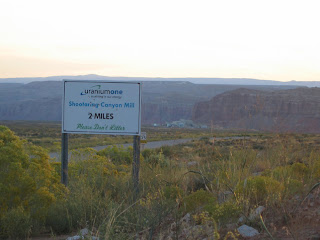Comment: Could this be Virginia's future if the part time VA leaders lift the ban on uranium mining and then one day Russia just shutters the doors, leave the waste! Will VA and our county have (really taxpayers) to clean up the mess (well, the mess can never really be clean up?) Now look at the following statement: "Shootaring Canyon Uranium Mill, which has been shuttered for much of its life." So why does the local/Canadian uranium corporation want to build a mill? No to uranium mining or milling!
By JUDY FAHYSThe Salt Lake Tribune
Published: October 10, 2010 12:00AM
Shootaring Canyon Uranium Mill, which has been shuttered for much of its life, will be owned by a subsidiary of Rosatom, the nuclear arm of the Russian government, under a deal that is expected to be completed by the year's end.Ticaboo
But soon the same mineral-rich landscape will be largely owned by the country .
By year’s end, the Russian mining company Atomredmetzoloto (ARMZ) will have a controlling stake in the Canadian company Uranium One.
When that happens, the town itself, the Shootaring Canyon uranium mill a few miles up the highway, more than 10,000 acres of uranium claims in Utah and holdings in South Dakota, Wyoming and Texas — all of it will be in the portfolio of ARMZ’s parent company, Rosatom, the Russian nuclear agency, which last month provided fuel for Iran’s nuclear power plant.
The pending sale is stirring up interest everywhere from Ticaboo’s dirt driveways to the shiny corridors of the U.S. Capitol, where four members of Congress last week said the deal might threaten national security and should be stopped.
The controversy can easily be blamed on the globalization of the nuclear industry, a trend that kicked into high gear in 1993 with the Megatons to Megawatts program.
Another result was the disintegration of boundaries in the uranium-mining industry, a trend that has picked up in uranium-rich Utah.
For instance, Canada-based Denison Mines not only mines uranium from its southeastern Utah claims. It also operates a uranium-processing mill near Blanding that is the only active plant of its kind in the nation.
Uranium One, meanwhile, snatched up properties once owned by U.S. Energy Corp., of Golden, Colo., such as the mill, reserves and the town.
Sarah Fields, director of the Moab-based group Uranium Watch, called the situation “rather bizarre,” because uranium mining in the Four Corners area was born in the last century to supply weapons for World War II and later the Cold War.
“It’s an odd, odd situation,” she said.
Jeff Parsons, an attorney for a watchdog group called Western Mining Action Project, has been considering what the trend means in Wyoming. There, the ownership change would affect several Uranium One assets, including a proposed mill and three mines.
Parsons notes that the foreign companies with claims to U.S. minerals pay no royalties under the 1872 Mining Act.
“Everywhere else in the world they would have to pay a royalty or a tax for the minerals.” he said. “We’re literally giving it away to these foreign countries.”
Parsons said he is not sure if his group will weigh in on the regulatory review of the ownership control that is now being done by the U.S. Nuclear Regulatory Commission. That assessment, which is open for public comment until Oct. 20, looks only at whether the controlling owners have the technical know-how and the financial wherewithal to operate the Wyoming facilities.
Meanwhile, the Utah Division of Radiation Control is doing a similar review. The division has oversight authority for the Shootaring Canyon Mill even though it has been shut down for all but the first four months of its 28 years.
“This change in control does not impact the operations,” said John Hultquist, who is responsible for the state’s regulatory review and notes that the Russian connection is not part of the state’s evaluation. “For us, I don’t think it’s going to be a big deal.”
Uranium One shareholders voted on Aug. 31 to allow ARMZ to more than double its stake in the company. Rob Buchanan, investor relations manager for the Canadian company, indicated that nothing is expected to change in Utah because of the deal.
“I can tell you that we don’t have plans to develop any of our assets in Utah for the foreseeable future,” he said in an e-mail, “and we don’t expect this to change after our transaction with ARMZ closes.”
He also noted, “In general, Uranium One’s U.S. production will be for the purpose of providing additional domestic supply to U.S. customers.”
But four members of Congress are not so sanguine about the deal.
They wrote a letter last week urging U.S. Treasury Secretary Timothy Geithner to block it. Not only would the Russian-controlled company own 20 percent of U.S. uranium capacity, but it would also support a Russian energy industry that is fraught with corruption and already supplying nuclear-technology support to autocratic regimes in Iran and Myanmar, the lawmakers said.
“We believe the takeover of essential U.S. nuclear resources by a government-owned Russian agency, as would occur under the proposed transaction, would not advance the national security and interests of the United States,” said the Tuesday letter sent by U.S. Rep. Howard P. “Buck” McKeon, of California, and three other House Republicans. “We urge the [Treasury Department’s Committee on Foreign Investment] to recommend the President block this transaction.”
Read more:
http://www.sltrib.com/sltrib/politics/50441386-90/uranium-town-nuclear-utah.html.csp




